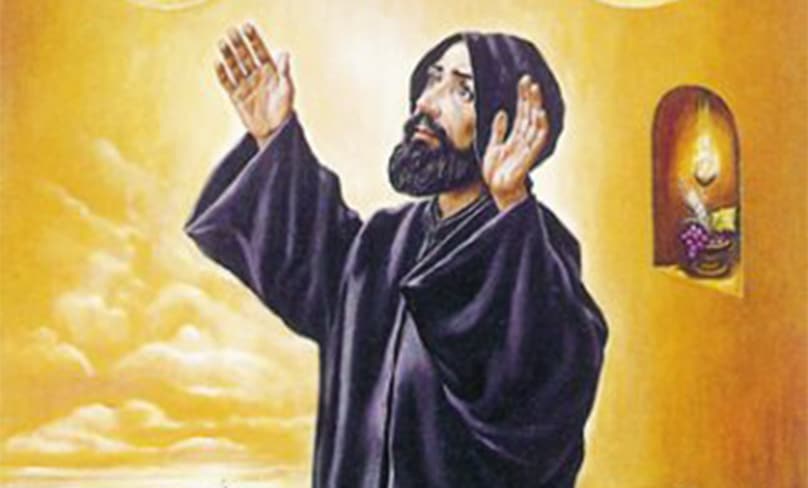
By Father Michael Sandrussi
On 14 December, the Catholic Church – and the Maronite Church in particular – celebrates the Feast of Saint Nehmetallah Al-Hardini, a monk and Priest of the Lebanese Maronite Order.
He was born “Youssef” in 1808 in Hardin, in the north of Lebanon. He entered the Order in 1828 and in 1830, professed his vows of obedience, chastity and poverty, and in 1833 was ordained into the priesthood.
He taught moral theology to the student monks of the Order, amongst whom was Saint Charbel. He served as Assistant General of the Order, until his death on 14 December in 1858.
The image we have of Saint Nehmetallah is of a monk in constant prayer and adoration.
There is no doubt he spent hours before the Lord in the Eucharist. There is no doubt that he was in constant prayer.
However, his words and his actions suggest his spirituality embraced God and neighbour in a very human and compassionate way, expressing the importance of fraternal charity. He maintained that: “A monk’s first concern, night and day, should be not to hurt or trouble his brother monks.”
It is striking that Saint Nehmetallah would take this as his “first” concern. Considering his commitment to prayer and a personal relationship with Christ, he makes as his first concern a monk’s ongoing relationship with his brother monks.
How could this primary concern of fraternity be measured against the Gospel and all of scripture? If we look at the ten commandments, the first three commandments concern our relationship with God, and the following seven concern our relationship with our neighbour.
Furthermore, when Jesus was asked about the greatest commandment in the law, He replied: “Love the Lord your God with all your heart and with all your soul and with all your mind. This is the first and greatest commandment. The second commandment is however like it: “Love your neighbour as yourself.” (Mt 22:37-39)
Christ in his Sermon on the Mount also notes the importance of our duty towards others before our duty towards God saying, “If you are offering your gift at the altar and there remember that your brother has something against you, leave your gift there before the altar. First go and be reconciled to your brother; then come and offer your gift.” (Mt 5:23-24)
This emphasises that while our first duty as humans is towards God, we are called to be reconciled to our fellow brothers and sisters, as a prerequisite for reconciliation with God.
The underlying premise is that a good relationship with God includes a good relationship with our neighbour. And in that sense, Saint Nehmetallah was concerned with honesty, authenticity and consistency in relationships with others.
Saint Isaac of Nineveh, the famous Syriac Father of the seventh century, expresses this when he says that “prayer accords strictly with behaviour”.
This means that there is no real difference between prayer and works, between spirituality and morality. Saint John in his epistle expresses the same, saying, “He who does not love his brother whom he has seen, cannot love God whom he has not seen.” (1 Jn 4:20)
For Saint Nehmetallah, prayer was a statement of our relationship with God, but also with our neighbour. In prayer we may, for example, ask God for forgiveness for having done wrong to our neighbour, but that is not sufficient.
We are to seek forgiveness from our neighbour in order for our prayer to be accepted by God. We may, for example, pray with devotion and fervour, spending quality time with God.
We may raise our arms in prayer, or kneel for extended periods in Church. However, if doing this, we ignore our problems with our neighbour, then our prayer is not sufficient.
Saint Nehmetallah teaches it is essential to come to God with a clear conscience or at least with a firm intention to reconcile with our brothers and sisters.
It is no surprise then that he chose life in community rather than as a hermit. When his brother, Fr Elisha, also a monk and hermit in the Lebanese Maronite Order, suggested he withdraw to a hermitage to grow more in his relationship with God, Saint Nehmetallah responded by saying, “Those who struggle for virtue in community life will have greater merit.”
This does not suggest that hermits receive less merit than those in the community. On the contrary, one of the requirements of becoming a hermit is moral excellence within the community. And for Saint Nehmetallah, virtue in community life always keeps one’s prayer life in order and balance.
He also teaches us that prayer, even personal prayer, has a social dimension. We come to God in prayer with the people whom we encounter.
We do not come to God simply as isolated individuals. This is because the God whom we pray to also comes to us, not as an isolated individual, but as the Trinity, the Father, the Son and the Holy Spirit. Prayer therefore is Trinitarian, it is communion with others and with God, and it is this communion that Saint Nehmetallah stressed in his life.
May his prayers be with us all.
Father Michael Sandrussi is a monk of the Lebanese Maronite Order currently residing at St Charbel’s Monastery in Punchbowl.
